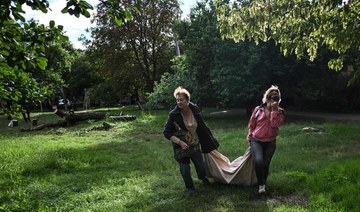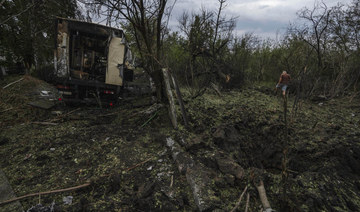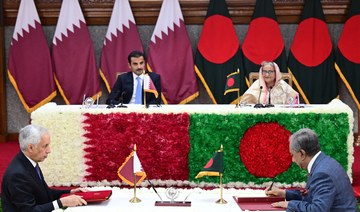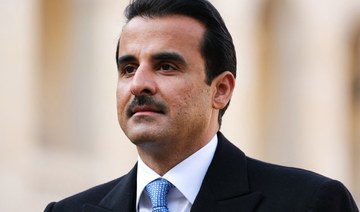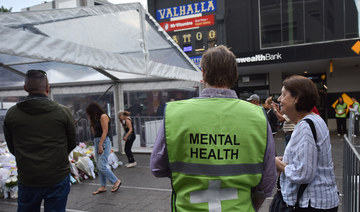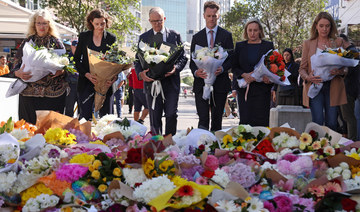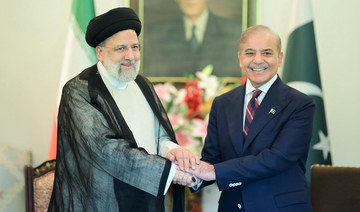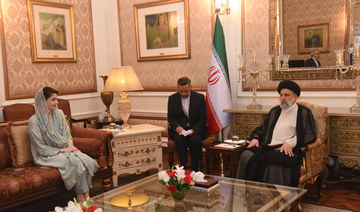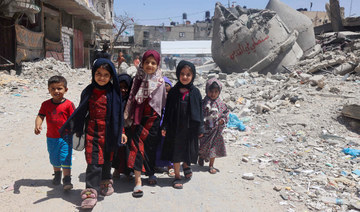KYIV: President Volodymyr Zelensky on Tuesday visited the frontline region of Donetsk in east Ukraine, describing fighting in the area as “difficult” with Russian forces pushing to capture the industrial city of Bakhmut.
The visit came as Russian President Vladimir Putin convened his security council in the wake of the latest spate of drone attacks on military-linked facilities inside Russian territory.
The focus of fighting in Ukraine has shifted to Donbas after Kyiv’s forces recaptured the southern city of Kherson last month following a Russian retreat from the regional capital.
Zelensky appeared in a video wearing a heavy winter coat, standing next to a large sign in Ukraine’s blue and yellow colors bearing the city name Sloviansk and calling for a moment of silence to commemorate killed Ukrainian soldiers.
“The east of Ukraine today is the most difficult front. And I am honored to be here now with our defending troops in Donbas. I believe that next time we will meet in our Ukrainian Donetsk and Lugansk and in Crimea as well,” Zelensky said.
Russian forces and their proxies have controlled parts of Donetsk and Lugansk since 2014, when fighting with separatists broke out and the Kremlin annexed the Crimean peninsula from Ukraine.
“From the bottom of my heart, I congratulate you on this great holiday, the Day of the Armed Forces,” said Zelensky, who was later shown meeting soldiers and distributing awards.
In the nearby Russian-controlled city of Donetsk, its Moscow-appointed mayor said that Ukrainian shelling had killed six civilians and injured others.
The Ukrainian leader has visited several frontline regions after more than nine months of fighting, including Kherson in the south recently recaptured by Ukrainian forces, calling its recapture “the beginning of the end of the war.”
Sloviansk, which was among regions in Donetsk briefly held by Russian-backed separatists, lies some 45 kilometers (28 miles) north of Bakhmut, which has become the center of fighting since Kherson’s fall.
The Kremlin said Putin met senior officials to discuss issues related to the country’s “domestic security” and that Russia was taking “necessary” measures to fend off more of what it said were Ukrainian attacks.
Officials in Russia’s Kursk region near the border with Ukraine said earlier Tuesday that a drone attack near an airfield had caused a fire at an oil storage unit.
That attack came after the defense ministry said a day earlier that Ukraine had tried to attack another airfield in Ryazan region and also the key Engels airfield in the Saratov region.
Engels is a base for the country’s strategic aircraft that Kyiv says have been used to strike Ukraine, and both sites are hundreds of kilometers away from Ukraine’s border.
The British defense ministry said that if Russia deems Ukraine to have been responsible then Moscow will “probably consider them as some of the most strategically significant failures of force protection since its invasion of Ukraine.”
The drone attacks come on the back of weeks of systematic Russian attacks that have crippled Ukrainian critical infrastructure like water, electricity and heating ahead of winter.
Russia on Monday fired another barrage of dozens of missiles that knocked out power and water in cities across Ukraine, the latest wave of attacks that Moscow has said Kyiv was responsible for because it refused Russian demands.
Defense Minister Sergei Shoigu on Tuesday said that Russian forces were using long-range, precision weapons to target military-linked facilities and “crush the military potential of Ukraine.”
The defense ministry also announced Tuesday it had received back from Ukraine captivity 60 Russian servicemen in their most recent exchange.
Russia’s invasion and its decision to conscript hundreds of thousands of men has set off an exodus of Russians from the country, including critical politicians and journalists.
However, neighboring Latvia announced Tuesday it was revoking the license for exiled independent TV channel Dozhd for multiple violations that included showing the Crimea peninsula annexed from Ukraine as part of Russia.
“The laws of Latvia must be respected by everyone,” Ivars Abolins, head of the Latvian National Electronic Mass Media Council, said on Twitter.
Zelensky visits Donbas near ‘difficult’ Ukraine front
https://arab.news/24fyz
Zelensky visits Donbas near ‘difficult’ Ukraine front
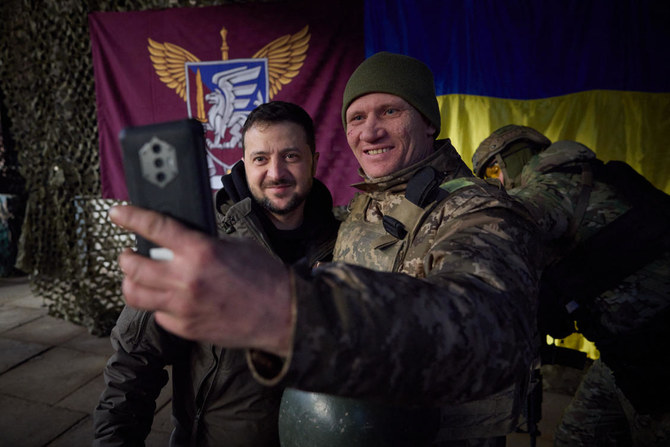
- The focus of fighting in Ukraine has shifted to Donbas after Kyiv's forces recaptured the southern city of Kherson
- Zelensky appeared in a video wearing a heavy winter coat, standing next to a large sign in Ukraine's blue and yellow colours bearing the city name Sloviansk
Four injured as escaped army horses bolt through central London
Photos and video posted on social media by British news outlets showed two horses running along busy roads, dodging buses, taxis and other traffic.
Both were wearing saddles and bridles, with one apparently covered in blood on its chest and forelegs.
A number of prestigious army cavalry regiments have stables in the British capital and horses are a regular sight around government buildings on Whitehall, Buckingham Palace, The Mall and in nearby Hyde Park.
London Ambulance Service said it was called at 8:25 am (0725 GMT) to reports of a person being thrown from a horse on Buckingham Palace Road.
No details were released on the injured people or the exact circumstances of their injuries.
The driver of a Mercedes car told LBC radio he had been waiting outside a hotel in Buckingham Palace Road when he felt something smash into his car.
He said he saw three or four horses near the vehicle, and that an army rider had been thrown off and injured.
One horse also reportedly crashed into a parked double-decker tour bus, smashing the windscreen.
One commuter shared a video on social media platform X, formerly Twitter, showing a black horse and a white horse being pursued by a black car.
“It was the street from Tower Bridge toward Limehouse Tunnel... just running past cars and an unmarked Range Rover following them,” the person said.
Up to seven horses initially got loose, Britain’s domestic Press Association news agency reported, with police working with the army to recapture them.
The army said in a statement that “a number of military working horses became loose during routine exercise this morning.”
“All of the horses have now been recovered and returned to camp. A number of personnel and horses have been injured and are receiving the appropriate medical attention,” it added.
Two of the horses were recaptured by the City of London Police, which polices the Square Mile financial district.
It said officers had contained two animals and that “an army horse box had collected the horses and transported them to veterinary care.”
Nepal’s president asks visiting Qatari emir to help free student held hostage by Hamas

- Al-Thani said he would do everything possible to help release Bipin Joshi
- Joshi was among 17 Nepali students studying agriculture in Alumim kibbutz
Katmandu, Nepal: Nepal’s president asked the emir of Qatar, who is on a two-day visit to the South Asian country, to help release a Nepali student held hostage by Palestinian militant group Hamas, officials said on Wednesday.
President Ram Chandra Poudel met with Sheik Tamim bin Hamad Al-Thani at the president’s house in the capital, Katmandu.
Al-Thani said he would do everything possible to help release Bipin Joshi, the Nepali president’s press adviser, Kiran Pokharel, told The Associated Press.
Joshi was among 17 Nepali students studying agriculture in Alumim kibbutz, near the Gaza Strip, when Hamas attacked Southern Israel on Oct.7. Ten of the students were killed, six injured while Joshi was abducted and taken to Gaza.
Though there has been no information on his condition or whereabouts, Nepali officials said they believed he was still alive.
Hamas’ sudden attack on Israel in October killed 1,200 people and some 250 others hostage were taken hostage. This has sparked a war that has so far killed more than 34,000 Palestinians in Gaza, at least two-thirds of them women and children, according to the local health ministry.
Qatar has played a key intermediary role throughout the war in Gaza. Along with the US and Egypt, the Gulf State was instrumental in helping negotiate a brief halt to the fighting in November that led to the release of dozens of hostages.
Pokharel also said the emir discussed the conditions of an estimated 400,000 Nepali migrant workers residing in Qatar, who mostly work in construction and manual labor. Concerns about working in extreme heat — that could reach over 40 C (104 F) — inadequate living facilities and abuse have risen in recent years.
Human Rights Watch released a statement on Sunday, asking that labor protection for migrant workers be prioritized during the emir’s visit.
The emir said there were programs planned to help Nepali workers find employment in other sectors, Pokharel said.
Al Thani also said his country planned to cooperate with Nepal on building hydropower plants, food production, and in the agriculture and tourism sectors.
The emir’s stop in Katamdnu is his last after visiting Bangladesh and the Philippines. He flies home later on Wednesday.
Australian counter terrorism force arrests seven teenagers after Sydney bishop stabbing
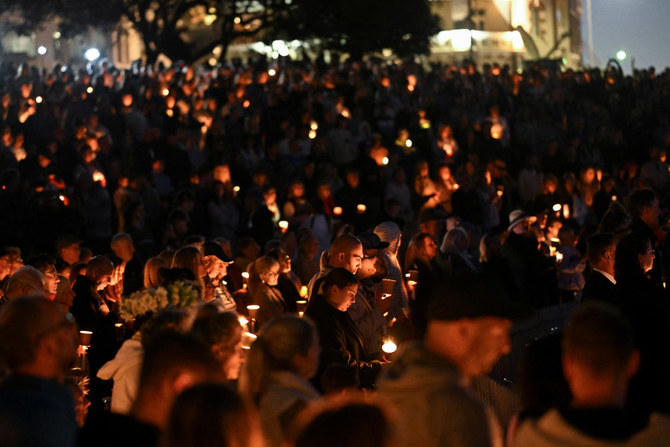
- A team of more than 400 police and security personnel were involved in the operation
- Police said they took the teens into custody because they posed an “unacceptable risk” to society
SYDNEY: An Australian counter terrorism team arrested seven teenagers on Wednesday linked to a boy charged with a religiously-motivated terror attack on a Sydney bishop and questioned another five people.
Police said a team of more than 400 police and security personnel were involved in the operation, which arrested associates of a 16-year-old boy charged with a terrorism offense for the knifing of Assyrian Bishop Mar Mari Emmanuel during a live-streamed church service on April 15.
Police said they took the teens into custody because they posed an “unacceptable risk” to society. They will allege the teens believed in a religiously motivated violent extremist ideology. A further five people are being questioned by police.
“I can assure the community there is no ongoing threat to the community, and the action we have taken today has mitigated any risk of future or further harm,” said New South Wales state Police Deputy Commissioner David Hudson at a news conference following the arrests.
Police said in a statement that the operation was ongoing.
Coming only days after a deadly mass stabbing in Bondi, the attack on Emmanuel and fears of further attacks or reprisals against the city’s Muslim community have put the normally peaceful Sydney on edge. Gun and knife crime is rare in the city, one of the world’s safest.
The Joint Counter Terrorism Team (JTT) operation, which involved 13 raids in Sydney and the regional town of Goulburn, was a combined effort between state and federal police as well as the domestic intelligence agency.
A significant amount of electronic material was seized in the raids, police said in a statement.
Australia’s top domestic spy chief on Tuesday asked technology companies to give it access to user messages in limited circumstances so it could fight extremists.
Iran president arrives in Sri Lanka as minister sought for arrest
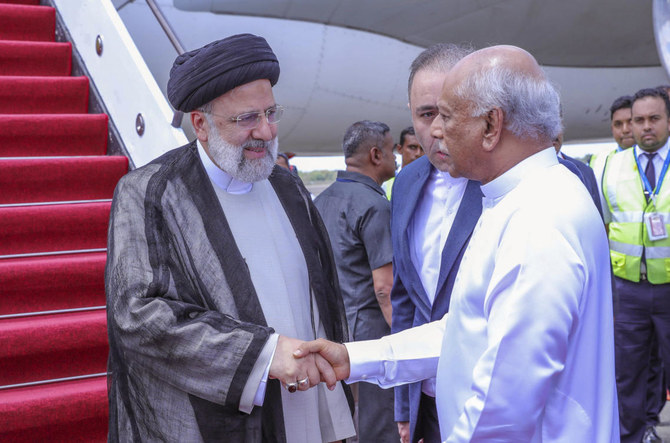
- Raisi traveled to the island nation after concluding a state visit to Pakistan
- Raisi arrived in Sri Lanka to inaugurate $514 million Uma Oya irrigation and hydro-electricity project
COLOMBO: Iranian President Ebrahim Raisi arrived in Sri Lanka on Wednesday to inaugurate a power and irrigation project, unaccompanied by his interior minister who is being sought for arrest over a deadly 1994 bombing.
Raisi traveled to the island nation after concluding a state visit to Pakistan alongside Ahmad Vahidi, accused by Argentina of orchestrating the 1994 attack on a Jewish community center in Buenos Aires that killed 85 people.
Interpol issued a red notice requesting police agencies worldwide to take Vahidi into custody, and Argentina had asked both Pakistan and Sri Lanka to arrest him.
But the minister was not seen accompanying Raisi, who had arrived in Sri Lanka to inaugurate an Iran-backed power and irrigation project.
Iran’s official news agency IRNA reported that Vahidi was back in Iran on Tuesday, where he attended a ceremony to induct a new provincial governor.
An official from Sri Lanka’s foreign ministry told AFP that the interior minister was not listed as part of the Iranian delegation.
The 1994 assault has never been claimed or solved, but Argentina and Israel have long suspected the Iran-backed group Hezbollah carried it out at Iran’s request.
Prosecutors have charged top Iranian officials with ordering the attack, though Tehran has denied any involvement.
The court also implicated Hezbollah and called the attack against the AMIA — the deadliest in Argentina’s history — a “crime against humanity.”
Delayed project
Raisi arrived at an airport in southern Sri Lanka on Wednesday morning to inaugurate the Iran-backed $514 million Uma Oya irrigation and hydro-electricity project.
It was due to be commissioned in March 2014 but sanctions against the Islamic Republic saw the project mired in a decade of delays, Sri Lanka has said.
Sri Lanka funded most of the $514 million project after an initial investment of $50 million from the Export Development Bank of Iran in 2010, while construction was carried out by Iranian firm Farab.
Sri Lanka President Ranil Wickremesinghe’s office said Raisi’s visit symbolized “the cooperation between the two nations in this significant infrastructure endeavour.”
The two reservoirs are slated to irrigate 4,500 hectares (11,100 acres) of new land, while the hydro dam generators have a capacity of 120 megawatts.
Iran is a key buyer of Sri Lanka’s tea, the island’s main export commodity.
Sri Lanka is currently repaying a legacy debt of $215 million for Iranian oil by exporting tea. The country’s only oil refinery was built by Iran in 1969.
Raisi arrived in Sri Lanka after a three-day visit to Pakistan that followed tit-for-tat missile strikes in January in the region of Balochistan, which straddles the two nations’ porous border.
Tehran carried out the first strikes against an anti-Iran group inside Pakistan, with Islamabad retaliating by hitting “militant targets” inside Iran.
Both nations have previously accused each other of harboring militants on their respective sides of the border.
Ending Mideast conflict not a priority for most Americans: Survey
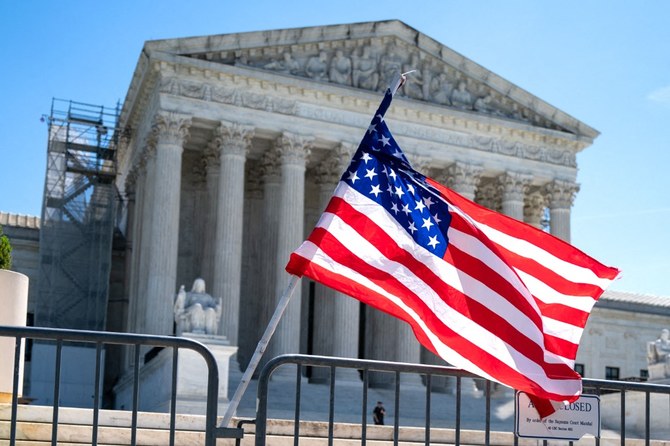
- 83% of respondents say Biden should focus on domestic policy
- 31% say supporting Israel should be given no priority
Chicago: A majority of Americans do not see the Israeli-Palestinian conflict as a foreign policy priority, according to two new concurrent surveys by the Pew Research Center.
Americans identified as their top four of 22 foreign policy priorities protecting the country from terrorism (71 percent), reducing illegal drugs (64 percent), preventing the spread of weapons of mass destruction (63 percent) and maintaining a military advantage over foreign powers.
Finding a solution to the Israeli-Palestinian conflict drew 29 percent, ranking only 14th among the 22 priorities.
The question of “supporting Israel” ranked even lower at 20th with 22 percent, with 31 percent opposing that support.
“Overall, a majority of Americans say that all 22 long-range foreign policy goals we asked about should be given at least some priority. Still, about three in 10 say supporting Israel, promoting democracy in other nations (28 percent) and supporting Ukraine (27 percent) should be given no priority,” Jacob Poushter, Pew associate director of research, told Arab News.
“Even with these priorities, 83 percent of Americans say it is more important for President Joe Biden to focus on domestic policy, compared with 14 percent who say he should focus on foreign policy.
“In 2019, 74 percent wanted then-President Donald Trump to focus on domestic policy, and 23 percent said he should focus on foreign policy.”
Pew researchers said finding a solution to the Israeli-Palestinian conflict was previously “a priority that saw no partisan difference at all” in a 2018 survey.
But the new surveys show a “partisan gap” emerging, with twice as many Democrats (36 percent) today than in 2018 calling the conflict “a priority,” while the share of Republicans (20 percent) has remained constant.
Twenty-nine percent of Americans say they have a great deal or fair amount of confidence in the UN’s ability to provide effective humanitarian aid to Gaza. Fifty-one percent do not have confidence and 19 percent are unsure.
Only 15 percent of Americans say they have confidence in the UN’s ability to enforce a ceasefire between Israel and Hamas. Sixty-seven percent have no confidence and 17 percent are unsure.
A recent Pew survey found that only 12 percent of Americans believe that lasting peace between Israelis and Palestinians is at least somewhat likely.



